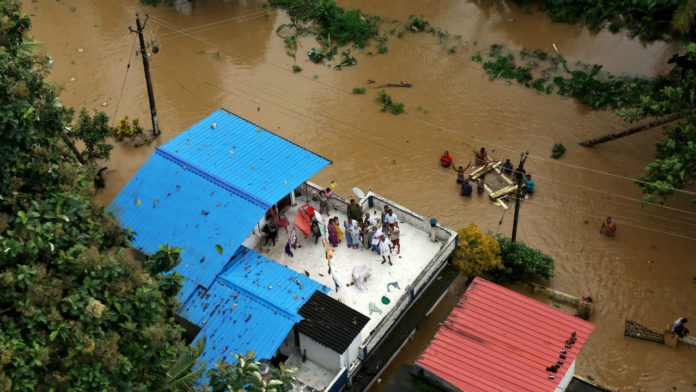ALUVA, India, Aug 20, 2018 (BSS/AFP) – The overpowering stench that fills
the air in the Kerala town of Aluva is an inescapable reminder that while the
filthy floodwaters may subside, the full toll of the devastating monsoon
deluge will take time to emerge.
The rain had barely stopped falling in the town on the outskirts of the
southern Indian state’s main city, Kochi, and abandoned cars, sodden
furniture and mattresses filled the streets while dirty black water still
flowed above knee-level.
A foul smell greeted people arriving at the Union Christian College, where
classrooms and halls became a relief camp for up to 4,000 at the peak of the
floods.
Some have started to leave. Residents who remain speculated that the stench
was from rubbish and dead cats, dogs and rats — or worse.
“Maybe it’s human,” said one survivor.
More than 400 people have died since heavy rain hit Kerala in recent weeks,
triggering deadly landslides and submerging entire villages as rivers burst
their banks.
“This smell is of five days without a bath,” said Savita Saha, one of the
migrants in the big hall. There are long queues at the school’s few toilets
and no bathroom to wash in.
“Everyone here is wearing the clothes they had when they escaped,” she
said, squeezed onto a jute mat with her husband, who works at a cashew
factory in Kochi.
In one classroom Rasitha Sojith, from the nearby neighbourhood of
Kaprassery, sobbed as she told how she escaped through chest-high waters
carrying her two-month-old son.
Sojith said water burst into her home without warning last Wednesday while
her father and sister, with her three children, were visiting to see the new
baby.
“With water rising fast, we only grabbed a few clothes for the baby and
went to the first-floor terrace of the neighbour’s house,” she said.
Torrential rain fell for hours and they grew increasingly fearful of
becoming trapped, until local fishermen rowed the family to safety the next
day.
“Everything is lost. Everything! We don’t even have money to go back to our
neighbourhood,” said Sojith.
“I don’t think we will be leaving this camp any time soon.”
– Muddy rubble –
An estimated 725,000 people are crammed into similar makeshift camps across
Kerala.
Authorities have given a provisional damage toll of $3 billion but the
extent of the destruction is likely to prove much greater, some officials and
legislators say.
In the Malikampeedika area of Kochi, Mumthaz, who goes by one name, found
the smell waiting for her when she returned home.
“This muddy rubble and stench is all that is left of our memories,” Mumthaz
told AFP, as she dragged out mud-caked mattresses and a sofa set, damaged
utensils and even her daughters’ school awards.
As word spread of flood warnings, Mumthaz had taken her two daughters on
Thursday to the home of her parents-in-law in another neighbourhood.
But floodwater soon surged through their house as well and the whole family
had to be rescued.
“It was surreal. The water was close to the knees at one point and within a
few minutes it was touching five feet, with a current so strong that we saw
big cars floating like tin cans,” she said.
With her husband searching for work in Dubai, Mumthaz knows she will
struggle to look after her daughters, with the family facing an uncertain
future after the nightmare of the floods.
“There is no kitchen, electricity and water here. I don’t know how long it
will take before I will be back… (in) my home,” she said.



